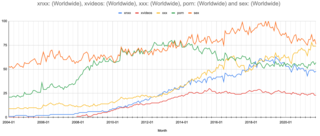Susanna Paasonen | |
|---|---|
| Born | 1975 (age 47–48) Helsinki, Finland |
| Alma mater | University of Turku |
| Known for | Writings on the rise in popularity of internet pornography |
| Scientific career | |
| Fields | Media Studies |
| Institutions | University of Turku |
| Thesis | Figures of fantasy: women, cyberdiscourse and the popular internet (2002) |
Susanna Paasonen (born 1975, Helsinki) is a Finnish feminist scholar. She is a Professor of Media Studies at the University of Turku, and was a visiting scholar at MIT in 2016. [1] She gained her PhD from the University of Turku in 2002; her dissertation was on gender and the popularization of the internet, [2] which was later published through Peter Lang. [3] After holding positions at the universities of Tampere, Jyväskylä and Helsinki, Paasonen was appointed Professor of Media Studies at the University of Turku on 1 August 2011, [4] and publishes on internet research, media theory, sexuality, pornography and affect. [5]
On Monday, 4 April 2016, Paasonen gave a lecture at Brown University in the USA on the politics and culture of online porn. [6] In the essay, "Glimmers of the forbidden fruit: Reminiscing pornography, conceptualizing the archive," [7] written along with Katariina Kyrölä, Paasonen traces the evolution of the "porn stash" from a physical collection to a digital one, and in doing so, examines cyberporn as a site of identity formation. She and Kyrölä suggest that pornography occasions the accumulation of a somatic archive, which are "not merely reservoirs of extra-cognitive sensation but also knowingly curated, reflected upon and reworked: they are simultaneously material and semiotic, intimate and culturally specific, affective and open to representation." In her lecture at Brown, Paasonen suggested that digital pornography must not be understood as something that creeps into society from the outside, but rather as something that already exists in contemporary culture. She writes, "Encounters with pornography therefore become incorporated as carnal capacity-- as what we can imagine our bodies enjoying and being capable of, or not enjoying and being capable of." Paasonen argues, therefore, that interactions with pornography, therefore, can contribute to the development of an individual's sexual identity.
The Finnish Academy of Science awarded her the Jutikkala Prize of €15,000 14 October 2011. [8] In the same year Paasonen published the book, Carnal Resonance: Affect and Online Pornography, through MIT Press. [9] In October 2020, Paasonen, Kylie Jarrett and Ben Light won the Association of Internet Researchers' Nancy Baym Book Award for NSFW: Sex, Humor, and Risk in Social Media, published with MITP in 2019. [10]

Annie M. Sprinkle is an American certified sexologist, performance artist, former sex worker, and advocate for sex work and health care. Sprinkle has worked as a prostitute, sex educator, feminist stripper, pornographic film actress, and sex film producer and director. In 1996, she became the first known porn star to get a doctoral degree, earning a PhD in human sexuality from the Institute for Advanced Study of Human Sexuality in San Francisco. Identifying as ecosexual, Sprinkle is best known for her self-help style of pornography, teaching individuals about pleasure, and for her conventional pornographic film Deep Inside Annie Sprinkle (1981). Through the production of feminist based pornographic content, include understanding of female genitalia and pornography based on women's desires, Sprinkle has contributed to feminist pornography and the larger social movement of feminism; she is also known for contributing to the rise of the post-porn movement and bisexual/lesbian pornography. Sprinkle, a bisexual and member of the LGBTQ+ community, married her long-time partner Beth Stephens in Canada on January 14, 2007.

Reasons for opposition to pornography include religious objections and feminist concerns, as well as alleged harmful effects, such as pornography addiction. Pornography addiction is not a condition recognized by the DSM-5, or the ICD-11. Anti-pornography movements have allied disparate social activists in opposition to pornography, from social conservatives to harm reduction advocates. The definition of "pornography" varies between countries and movements, and many make distinctions between pornography, which they oppose, and erotica, which they consider acceptable. Sometimes opposition will deem certain forms of pornography more or less harmful, while others draw no such distinctions.
Cyberfeminism is a feminist approach which foregrounds the relationship between cyberspace, the Internet, and technology. It can be used to refer to a philosophy, methodology or community. The term was coined in the early 1990s to describe the work of feminists interested in theorizing, critiquing, exploring and re-making the Internet, cyberspace and new-media technologies in general. The foundational catalyst for the formation of cyberfeminist thought is attributed to Donna Haraway's "A Cyborg Manifesto", third wave feminism, post-structuralist feminism, riot grrrl culture and the feminist critique of the alleged erasure of women within discussions of technology.
The feminist sex wars, also known as the lesbian sex wars, sex wars or porn wars, are terms used to refer to collective debates amongst feminists regarding a number of issues broadly relating to sexuality and sexual activity. Differences of opinion on matters of sexuality deeply polarized the feminist movement, particularly leading feminist thinkers, in the late 1970s and early 1980s and continue to influence debate amongst feminists to this day.
Pornography has been defined as sexual subject material "such as a picture, video, or text" that is intended for sexual arousal. Indicated for the consumption by adults, pornography depictions have evolved from cave paintings, some forty millennia ago, to virtual reality presentations. A general distinction of adult content is made classifying it as pornography or erotica.
Charles Steven Key, better known as Paul Morris, is the owner of Treasure Island Media, a San Francisco, California-based gay pornography studio that specializes in bareback pornography.

Internet pornography is any pornography that is accessible over the internet; primarily via websites, FTP connections, peer-to-peer file sharing, or Usenet newsgroups. The greater accessibility of the World Wide Web from the late 1990s led to an incremental growth of internet pornography, the use of which among adolescents and adults has since become increasingly popular.
Feminist views on pornography range from total condemnation of the medium as an inherent form of violence against women to an embracing of some forms as a medium of feminist expression. This debate reflects larger concerns surrounding feminist views on sexuality, and is closely related to those on prostitution, BDSM, and other issues. Pornography has been one of the most divisive issues in feminism, particularly in Anglophone (English-speaking) countries. This division was exemplified in the feminist sex wars of the 1980s, which pitted anti-pornography activists against pro-pornography ones.
Feminism has affected culture in many ways, and has famously been theorized in relation to culture by Angela McRobbie, Laura Mulvey and others. Timothy Laurie and Jessica Kean have argued that "one of [feminism's] most important innovations has been to seriously examine the ways women receive popular culture, given that so much pop culture is made by and for men." This is reflected in a variety of forms, including literature, music, film and other screen cultures.

Gail Dines is professor emerita of sociology and women's studies at Wheelock College in Boston, Massachusetts.
Queer pornography depicts performers with various gender identities and sexual orientations interacting and exploring genres of desire and pleasure in unique ways. These conveyed interactions distinctively seek to challenge the conventional modes of portraying and experiencing sexually explicit content. Scholar Ingrid Ryberg additionally includes two main objectives of queer pornography in her definition as "interrogating and troubling gender and sexual categories and aiming at sexual arousal."

Jiz Lee is an American pornographic performer, considered a major star of queer porn. Lee is an advocate for the ethical production and consumption of pornography and for the labor rights and sexual autonomy of adult entertainment performers.
Rule 34 is an Internet meme which claims that Internet pornography exists concerning every possible topic. The concept is commonly depicted as fan art of normally non-erotic subjects engaging in sexual behavior and/or activity. It can also include writings, animations, images, GIFs and any other form of media to which the internet provides opportunities for proliferation and redistribution.
Feminist pornography is a genre of film developed by or for those within the sex-positive feminist movement. It was created for the purpose of promoting gender equality by portraying more bodily movements and sexual fantasies of women and members of the LGBT community.
subRosa is a cyberfeminist organization led by artists Faith Wilding and Hyla Willis.
Pornification is the absorption by mainstream culture of styles or content of the sex industry and the sexualisation of Western culture, sometimes referred to as raunch culture. Pornification, particularly the use of sexualised images of women, is said to demonstrate "how patriarchal power operates in the field of gender representation". In Women in Popular Culture, Marion Meyers argues that the portrayal of women in modern society is primarily influenced by "the mainstreaming of pornography and its resultant hypersexualization of women and girls, and the commodification of those images for a global market". Pornification also features in discussions of post-feminism by Ariel Levy, Natasha Walter, Feona Attwood, and Brian McNair. Pornography began to move into mainstream culture in the second half of the 20th century, now known as the Golden Age of Porn. Pornification is a product of the widespread availability of porn on the internet.
Baitbus.com is a website specialising in gay pornography of the gay-for-pay type, which claims to bring "straight boys over to the dark side". It has been described as "part practical joke and part fantasy that plays with the contingency of straightness and straight male identity in particular" by Susanna Paasonen.
Karen Elizabeth Boyle, is Professor of Feminist Media Studies at the University of Strathclyde, previously she was professor of Feminist Studies at the University of Stirling, and before that was a lecturer in film and television studies at the University of Glasgow. She has published a number of articles on feminism, violence and pornography.
Mireille Miller-Young is an associate professor of feminist studies at the University of California, Santa Barbara. Her research explores race, gender, and sexuality in visual culture and sex industries in the United States. Miller-Young holds a PhD in American History from New York University. She describes herself as an "academic pornographer", a term originally adopted by Sander Gilman.
Prema Murthy is an American, multi-disciplinary artist based in New York. Employing aesthetics, gesture, geometry and algorithmic processes, Murthy's work explores the boundaries between embodiment and abstraction, while engaging in issues of culture and politics. Her work has been exhibited nationally and internationally at MoMA PS1, the Whitney Museum of American Art, the New Museum of Contemporary Art, the Reina Sofia Museum, the Generali Foundation in Vienna, and the India Habitat Center-New Delhi.